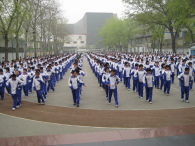Today, upon re-entry to work after the holidays. I was reminded of a moment in 2008, immersed in the Obama presidential campaign, when it hit me that the skills I was using to organize politically in the community were the same skills I used at work in education settings.
In our classrooms, in meetings, in professional development, we motivate and engage people in a united effort through: shared ownership, inspiration, immediate and long term goals, clear agendas for meetings, relevant information, questions that prompt interest or curiosity, quick ways to get to know each other and get down to work — not to mention how to help people think, learn and develop their own capacities to act.
We plan strategically step by step for both the short and long term, to reach desired outcomes. We build on relationships and previous knowledge, looking for points of interest and passion.
Our heavy lifting is in our constant and often intense interactions with people. We listen to those who disagree, who complain and criticize — and sometimes disarm them with an unexpected authentic response. We are accustomed to picking ourselves, our students and our colleagues up when we sink into despair. We are used to persevering in a long struggle against ever-changing challenges and shifting goal posts and a system that is so much larger than any one person can expect to affect. We establish relationships with individuals higher up in a political bureaucratic system to communicate our message and hopefully find mutual interest.
There are ways that working in schools sets us apart from other professionals whose focus is on the adult world, yet more and more I find the skills we use in education do translate to other fields. Maybe when work is for a good cause, we cross artificial boundaries of professions. Maybe this means that we have common ground in our struggles for social justice, health and well being across the planet. Then we could join our efforts, be a bigger, focused, united community — harder to ignore.

